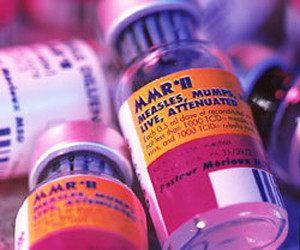The Facts About Measles

Measles is a highly contagious disease caused by a virus. The virus is transmitted by direct contact with infectious droplets or spread airborne when an infected person breathes, coughs, or sneezes. The measles virus can remain infectious on surfaces and in the air for up to two hours after an infected person leaves an area. According to the CDC, it is so contagious that if one person has it, 90% of the people around them will also become infected if they are not properly immunized.
Measles start with a fever, cough, runny nose, and red eyes. A rash of tiny, red spots breaks out soon after, starting at the head and spreading to the rest of the body. It can be very serious especially for young children, and can lead to pneumonia, encephalitis (swelling of the brain), and death.
With the MMR (measles, mumps, and rubella) vaccine measles can be prevented. The vaccine was first licensed in 1971 and is a two-dose series which provides 97% protection.
Who Needs the Vaccine?
Non-Healthcare Individuals
Children should get 2 doses of MMR vaccine:
- The first dose at 12 months through 15 months of age
- The second dose at 4 years through 6 years of age
Children can get the second dose earlier, as long as it is at least 28 days after the first dose.
Students at post-high school educational institutions without evidence of measles immunity need two doses of MMR vaccine, with the second dose administered no earlier than 28 days after the first dose.
People who are born during or after 1957 who do not have evidence of immunity against measles should get at least one dose of MMR vaccine.
Guidelines for international travelers differ so it is recommended to consult the CDC to verify the guidelines.
Healthcare Personnel
All persons who work in healthcare facilities should have evidence of immunity to measles on file.
Evidence of Immunity
According to the CDC, you are considered protected from measles if you have at least one of the following:
- Written documentation of adequate vaccination:
- One or more doses of a measles-containing vaccine administered on or after the first birthday for preschool-age children and adults not at high risk
- Two doses of measles-containing vaccine for school-age children and adults at high risk, including college students, healthcare personnel, and international travelers
- Laboratory evidence of immunity
- Laboratory confirmation of measles
- Birth in the United States before 1957
If you’re unsure whether you’re immune to measles, you should first try to find your vaccination records or documentation of measles immunity. If you do not have written documentation of immunity, you should get vaccinated with the MMR (measles-mumps-rubella) vaccine. There is no harm in receiving the MMR vaccine even if you may already be immune. You can also have your doctor test your blood to determine whether you’re immune, but this option is likely to cost more, may provide inconclusive results, and will take two doctor’s visits. Talk with your doctor to determine your best options.
If you still have questions regarding measles consult your doctor or visit the CDC website.
Tags: immunization, measles, mumps, preventive medicine, rubella, symptoms, vaccination, vaccine, virus
